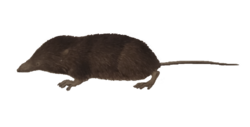Biology:Soriculus
| Soriculus | |
|---|---|

| |
| Himalayan Shrew (Soriculus nigrescens) | |
| Scientific classification | |
| Domain: | Eukaryota |
| Kingdom: | Animalia |
| Phylum: | Chordata |
| Class: | Mammalia |
| Order: | Eulipotyphla |
| Family: | Soricidae |
| Tribe: | Nectogalini |
| Genus: | Soriculus Blyth, 1854 |
| Species | |
| |
Soriculus is a genus of shrew native to Asia. Along with several fossil species, the only extant member of the genus is the Himalayan shrew, as other extant species have now been transferred to other genera .
Taxonomy
The genus Soriculus is placed within the tribe Nectogalini. Formerly, this genus included several more extant species, but they have now been moved to other genera such as Chodsigoa and Episoriculus. Species from the extinct European genus Asoriculus were also included here at one point. Currently the genus contains the extinct species Soriculus kashmiriensis and Soriculus kubinyi,[1] although in its description S. kashmiriensis was noted for being most closely related to species now placed in the genus Chodsigoa.[2] DNA research has confirmed the close relationship of Soriculus with the recently extinct Asoriculus and Nesiotites shrews from Europe.[3]
References
- ↑ Kurten, Bjorn (2017). Pleistocene Mammals of Europe. Taylor & Francis. ISBN 9781351499477.
- ↑ Sanwal, J.; Kotlia, B. (2005). "The first fossil Soriculus (Tribe Soriculini) in the Indian subcontinent from the Karewas of Kashmir, India". Journal of the Geological Society of India.
- ↑ Bover, Pere; Mitchell, Kieren J.; Llamas, Bastien; Rofes, Juan; Thomson, Vicki A.; Cuenca-Bescós, Gloria; Alcover, Josep A.; Cooper, Alan et al. (August 2018). "Molecular phylogenetics supports the origin of an endemic Balearic shrew lineage (Nesiotites) coincident with the Messinian Salinity Crisis" (in en). Molecular Phylogenetics and Evolution 125: 188–195. doi:10.1016/j.ympev.2018.03.028. PMID 29608962. https://linkinghub.elsevier.com/retrieve/pii/S1055790317306553.
Wikidata ☰ Q10820244 entry
 |

